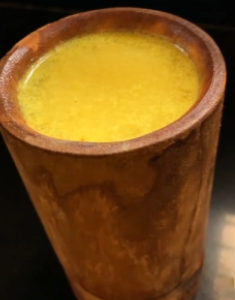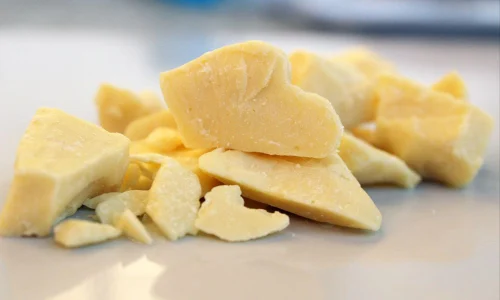Ayurveda emphasizes the use of natural remedies to treat various ailments, and one such Ayurvedic recipe as a remedy for healing the gut is the Kwathita drink, which has been used for over 5000 years. Kwathita is a recipe that is believed to be effective in treating indigestion, loss of appetite, flatulence, abdominal pain, hemorrhoids and overall gut health. The recipe is taken from the Bhavaprakasha Nighantu, one of the ancient Ayurvedic texts that contain information about medicinal plants and their therapeutic uses. How to prepare Kwathita? Here’s the recipe to make Kwathita. Ingredients: Ghee – 1 tsp Asafoetida – a pinch Turmeric – 1 tsp Peppercorns -2 buttermilk – 1 glass Salt – to taste Method of preparation: First, add all ingredients to a pan, and then boil the mixture for one minute. Remove the mixture from the flame in the first boil itself, else there will be solid clumps. Consume the drink with rice during lunch. Kwathita drink provides a nutritious and delectable accompaniment to any rice-based meal, and people say it facilitates digestion and improves gut health in general. Benefits of ingredients Ghee, or clarified butter, is an important ingredient in Ayurvedic medicine; moreover, it is known for its numerous health benefits. It has numerous health benefits. Ghee helps lubricate the digestive tract, promote the absorption of nutrients, and improve the overall health of the gut. Asafoetida, on the other hand, is a pungent spice with anti-flatulent properties. It is aids digestion and relieves bloating and gas. Turmeric, a popular spice used in Indian cuisine, has anti-inflammatory properties; therefore, it is often regarded as a beneficial addition to a healthy diet. It helps reduce inflammation in the gut; furthermore, it promotes the healing of the digestive tract. Pepper, another important ingredient in the Kwathita drink, that helps improve digestion and aids the absorption of nutrients. A fermented dairy product called buttermilk is, indeed, well-known for having probiotic benefits. It contains live cultures of advantageous bacteria that support the preservation of balanced gut flora. It also contains a lot of lactic acid, which helps with digestion and increasing nutrient absorption. The Ayurvedic recipe – Kwathita is, indeed, a proven, over 5000-year-old remedy for gut healing. Furthermore, it has stood the test of time, demonstrating its effectiveness across generations. It is best to take Kwathita as a side with rice during lunch time. The ingredients of the drink aid digestion, encourage digestive system healing and maintain a healthy balance of gut flora. Looking for ways to improve your gut health? Book a consultation with us today and we’ll help you heal! You can join our Health Programs for mind and body detox. If you are struggling with any health issues, you can either book a consultation with us or send us a message via WhatsApp to +91 79074 89839. We have the best Ayurvedic doctors in Trivandrum who are always glad to help you. If you have any queries, contact us. You can also visit us at our hospital.
Kwathita – A Traditional Recipe for Gut Healing


